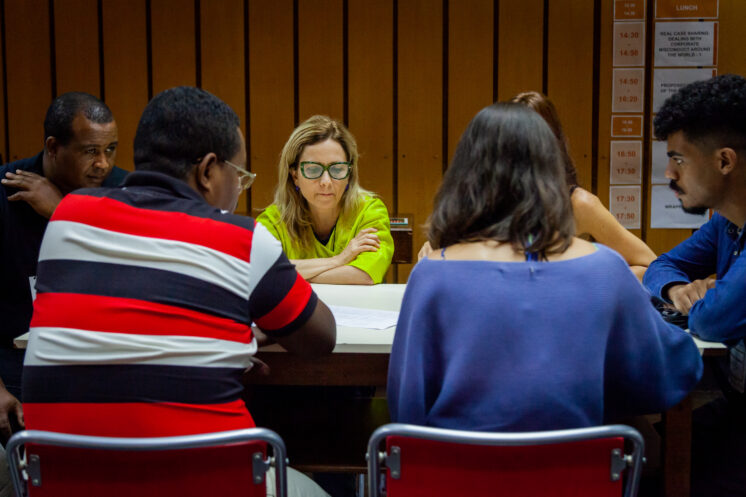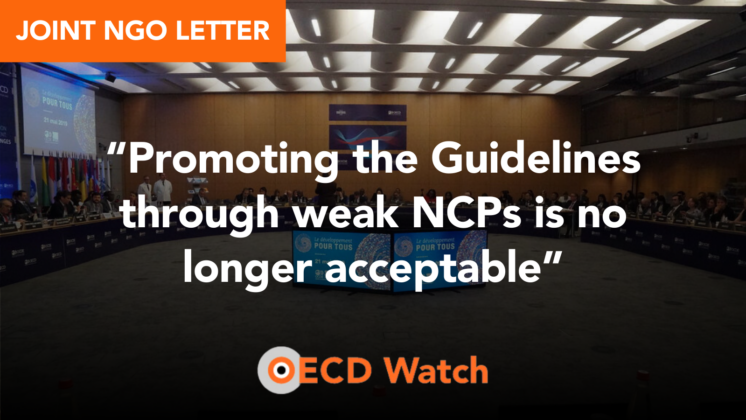This blog was originally published in Columbia FDI Perspectives on 20 February 2023.
Despite its soft law nature, the OECD Guidelines for Multinational Enterprises (Guidelines) have clear and proven potential to help generate impactful outcomes for victims of corporate misconduct. This Perspective outlines several strategies civil society have employed either to use the soft law standards in the Guidelines to influence development of hard law, or to use hard law to reinforce the standards and positive outcomes from complaints, thereby successfully promoting business uptake of the standards and/or ensuring remedy for complainants.
- Using the expectations in the Guidelines to urge lawmakers to close gaps in national and regional laws. Civil society has used both the Guidelines and the associated OECD due diligence guidance in advocating for several (proposed) laws on due diligence, including in Canada, France, Germany, the Netherlands, and the EU. These laws, which are largely based on the norms in the Guidelines and the United Nations Guiding Principles on Business and Human Rights (UNGPs), have the potential to deliver real remedies to adversely impacted people. The Guidelines have also been used to encourage national legislators to close gaps in existing domestic law. For example, in FNV vs NUON Energy, an NCP complaint filed by the Federation of Dutch Trade Unions at the Dutch National Contact Point (NCP), complainants alleged that the energy company had breached the Guidelines’ labor and employment provisions. Specifically, FNV alleged that NUON had relied on a loophole in Dutch labor law allowing its subcontractor to pay foreign workers less than Dutch workers performing the same duties. In its final statement, the NCP acknowledged the stronger expectations in the Guidelines vis-à-vis Dutch law in terms of the supply chain responsibilities of companies for employment practices. The NCP recommended that the government close this gap—and the Dutch parliament did so soon thereafter.
- Citing the Guidelines in legal proceedings to encourage their implementation by companies. In a recent well-known Dutch court case, Milieudefensie et al. vs. Royal Dutch Shell, the applicant argued that the company owed a duty of care to address its climate impacts based on soft law standards, including as contained in the Guidelines and UNGPs. In May 2021, the court found that these standards do form the basis of this duty of care under Dutch tort law. By accepting this argument, the court effectively implemented the Guidelines and UNGPs into Dutch law.
- Insisting that companies comply with NCP-brokered agreements. During NCP mediation in Sherpa et al. vs Bolloré, the parties reached agreement that palm oil company SOCAPALM’s shareholder Bolloré would exercise its leverage to encourage remedy of SOCAPALM’s negative impacts on environmental and labor rights. In 2013, the parties developed a remedy action plan to be implemented under external monitoring; however, in 2014, Bolloré ceased implementing the agreement. Sherpa subsequently sued Bolloré in a French court, requesting enforcement of the NCP-mediated agreement under French contract law. Although the case is still pending, it demonstrates the potential for companies to be bound by joint agreements brokered during NCP processes.
- Using NCP complaints to clarify or expand responsible business conduct standards from relevant international (expert) bodies. The NCP complaint Society for Threatened Peoples Switzerland vs UBS Group addressed the bank’s ties to passive investments supporting the forced labor of Uighurs. Following the Swiss NCP’s determination that no business relationship under the Guidelines existed between UBS and its nominee shareholdings, thereby exempting the bank from related human rights responsibilities, BankTrack and the Centre for Research on Multinational Corporations (SOMO) sought and attained contrary clarification from the UN Office of the High Commissioner for Human Rights (OHCHR), establishing more broadly applicable soft law guidance on the responsibility of banks with respect to their financial services. The OHCHR’s opinion clarified the issues raised in the NCP complaint and the expectations in the UNGPs. While not legally binding, expert opinions such as the OHCHR’s would be highly persuasive in any future litigation or legislation on this issue and influential for another NCP considering a different complaint on the same issue.
Using the Guidelines and NCP complaints in connection with hard law, either to push for a broader interpretation of responsible business conduct in legislation or case law, or to seek enforcement of positive NCP outcomes, has been successful in cases brought by civil society. These cases suggest that the soft law Guidelines can be a useful tool not only in advocating for greater corporate responsibility to respect human rights and the environment—but also in strengthening the legal framework on corporate accountability.
*Marian Ingrams ([email protected]) and Katharine Booth ([email protected]) are, respectively, Network Coordinator and Policy Advisor/Researcher for OECD Watch, the official representative of civil society to the OECD Investment Committee. Both are also researchers at the Centre for Research on Multinational Corporations (SOMO). This Perspective draws on OECD Watch’s webinar, “The OECD Guidelines and the pursuit of accountability: Exploring case examples on how the OECD Guidelines are influencing development of ‘hard law’ on business & human rights,” February 22, 2022. The authors wish to thank their colleagues from the following organizations for their comments: BankTrack, European Coalition for Corporate Accountability (ECCJ), Milieudefensie/Friends of the Earth Netherlands, and Sherpa. The authors also wish to thank Federico Ortino, Stephan Schill and an anonymous peer reviewer for their helpful peer reviews.
The material in this Perspective may be reprinted if accompanied by the following acknowledgment: “Marian Ingrams and Katharine Booth, ‘Hardening soft law: Strategic use of the OECD Guidelines to achieve meaningful outcomes’ Columbia FDI Perspectives No. 351, February 20, 2023. Reprinted with permission from the Columbia Center on Sustainable Investment (http://ccsi.columbia.edu).” A copy should kindly be sent to the Columbia Center on Sustainable Investment at [email protected].
read more less













